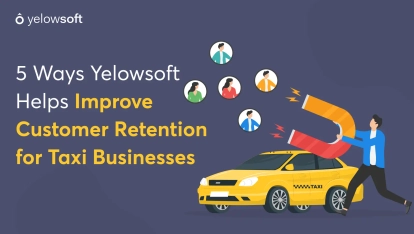The private hire cab sector has turned into a crucial component of contemporary transport.
In an era where convenience and flexibility influence consumer decisions, private hire services offer a solution that is more versatile than public transport and also a dependable choice for millions globally.
From everyday travels to urgent journeys, private hire taxis are essential in assisting individuals to arrive at their destinations swiftly and comfortably.
Nonetheless, with the increasing demand for convenient services, customer expectations also rise.
Modern customers seek more than mere transportation, they desire a smooth booking process that aligns with their fast-moving lives.
This is where a comprehensive booking approach for taxi services becomes essential.
By combining various booking platforms, including apps, websites, social media, and third-party services, companies can provide more accessible, adaptable, and efficient services.
Taxi businesses can use omni-channel booking for better customer reach, as they can "connect with customers at their location."
Whether a customers opts to book via a mobile app, a website, or social media, businesses secure bookings from numerous channels.
This strategy addresses the demands of today’s consumers while also giving businesses a competitive advantage.

The concept of a omni-channel booking
Fundamentally, an omni-channel booking approach focuses on delivering a smooth customer experience through various channels. In this method, every customer engagement, whether via an app, website, social media, or phone, is linked in a manner that seems cohesive.
Omni-channel booking differs from a multi-channel strategy, which has distinct channels that do not connect with one another. In omni-channel, every channel interacts with the others. This guarantees a seamless, cohesive experience that saves customers time and boosts their satisfaction.
Omni-channel booking and customer satisfaction are interconnected. Allowing customers to select the booking method that fits them best, results in increased bookings.
This method enables businesses to collect information from multiple sources, offering understanding of customer preferences and behaviors. The gathered information can assist private hire firms in enhancing their service efficiency, personalizing customer experiences, and even forecasting demand trends.

Essential Platforms to integrate into an omni-channel approach
We all know choosing an omnichannel booking strategy is going to require integration of multiple channels. But exactly which channels are there to select from. Let’s see.
Mobile application
Having a mobile app is essential. The majority of individuals keep their phones close at all times, which makes a mobile app one of the most accessible booking alternatives.
A high-quality app offers an easy-to-navigate booking experience. As it consists of elements such as fare estimates, driver monitoring, multiple payment options, etc.
A user-friendly app ensures seamless operation on both iOS and Android systems. For users, the application must offer a fast and simple reservation process that saves time and improves convenience.

User-friendly website
A website is important for clients who might not have your app or choose to make reservations on a bigger display. An online taxi booking platforms for private hire services must have user-friendly interface, an obvious booking choice, and availability of customer support. Similar to the mobile application, the website must be responsive, indicating it adjusts to various screen dimensions, facilitating ride bookings for customers on both desktop and mobile devices.
The site serves as an excellent platform to present important details regarding your services, including pricing, service zones, and common inquiries. Adding a link to download your app on the site encourages app installations and provides customers with a complete array of booking choices.

Integration of social media
Social media networks such as Facebook and WhatsApp provide distinct chances to connect with customers and streamline reservations. Taxi booking on social media platforms provides convenience for users who frequently engage with these platforms. For instance, incorporating a booking option in Facebook Messenger or WhatsApp enables users to arrange rides while conversing with friends or organizing events. This integration targets new customer groups and simplifies the booking process for individuals who favor engaging through social media.
Social media serves as a great platform for immediate promotions, collecting customer feedback, and engagement, fostering more robust connections with customers.
Integrations with 3rd party website/apps
Partnering with third-party services like Google Maps, hotel reservation websites, or well-known travel applications can greatly enhance your visibility. When customers are organizing trips or looking for directions, the ability to book a ride straight from these platforms provides convenience and expands your customer reach.
For example, connecting with Google Maps allows customers looking for directions to immediately view your service as a choice. This integrated visibility enhances brand recognition and allows for omnichannel reservations to improve customer experience.
Challenges encountered by private hire taxi companies in adopting an omni-channel approach
Implementing an omni-channel approach provides significant advantages, yet it also presents challenges. Recognizing these challenges can assist businesses in planning more effectively and ensuring a smoother execution.
Starting expense and investment
Establishing an omni-channel booking approach demands a considerable initial investment. Creating a mobile application, enhancing the website, and establishing connections with external services can be expensive. Moreover, managing each channel and guaranteeing a smooth experience can increase operational expenses. Although these investments yield benefits in the long run, smaller firms might struggle with the upfront expenses.
Channels integration
Developing an omni-channel experience entails ensuring that all platforms interact smoothly. This integration can be intricate and demands strong software solutions to guarantee that data moves correctly between platforms. Investing in a centralized booking system is crucial to ensure real-time data synchronization and avoid booking conflicts, overbooking, or mistakes.
Staff training
An omni-channel approach helps employees who are properly trained to manage cross-channel taxi bookings. Workers might require instruction on utilizing new reservation software, comprehending the specific features of each platform, and supporting customers through various channels. Holding regular training sessions will ensure your team remains current and delivers improved customer support.
Confidentiality and protection of data
Omni-channel booking depends significantly on digital platforms, which entails the duty of data privacy and security. Gathering and retaining customer data requires private hire firms to adhere to data protection laws, including GDPR. Securing data fosters customer confidence and safeguards against possible breaches that may harm your company's reputation.
How can a private hire taxi service implement an omni-channel booking strategy?
Even with the difficulties, executing an omni-channel booking strategy for taxi companies is possible through planning. Below are essential steps for a seamless transition.
Recognize customers’ preferences
Begin by grasping the booking channels that your customers favor. Carry out surveys, evaluate booking information, and examine feedback to gain insights into their requirements.
This data will direct your approach, making certain you concentrate on the channels that will prove to be the most impactful.
Combine core booking channels
Start by establishing and connecting essential platforms: the mobile application, website, and telephone service. Every channel ought to be intuitive and offer a comparable booking experience. Ensuring these channels are straightforward and easily reachable will accommodate customer desires for flexibility and options.
Establish a centralized booking system
A unified booking system connects all channels, minimizing mistakes and facilitating seamless reservations. By aligning bookings instantly, you avoid overbooking and guarantee precise availability details. This system also enables you to gather data from every channel, offering important insights.
Think about third-party integrations
Broaden your reach by connecting with well-known platforms such as Google Maps and travel sites. Integrating with third parties can assist in drawing new clients who might not discover your service otherwise. This exposure enhances brand recognition and establishes your business as an easy option.
Standard user experience across channels
Ensure that every channel provides a uniform experience to improve taxi service efficiency with omni-channel booking. Branding, terminology, and reservation processes need to be consistent to ensure customers are at ease when transitioning between platforms. Reliability fosters confidence and strengthens brand allegiance.
Enhance the omni-channel experience through data analysis
Utilize data analytics to monitor the effectiveness of every channel and pinpoint opportunities for enhancement. Keeping track of booking patterns, customer responses, and conversion metrics
allows you to modify your approach and optimize every channel, improving effectiveness and increasing customer loyalty.
Conclusion
In today’s rapid environment, an omni-channel booking approach for taxi firms is not merely a trend; it’s essential. Providing customers with the option to book via various channels fulfills their demands for convenience and accessibility. Utilizing omni-channel booking can enhance customer satisfaction, elevate bookings, and differentiate yourself in a competitive market.
By unifying essential platforms, grasping customer preferences, and utilizing a centralized system, private hire taxi firms can enhance efficiency and foster customer loyalty. Despite the challenges, the advantages of omni-channel booking in transportation greatly surpass the initial effort and investment required.






